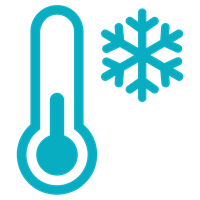Cold and Snow
 Winter weather can bring extreme cold, freezing rain, snow, ice and high winds. Cold and snow create a higher risk of car accidents, hypothermia, carbon monoxide poisoning/utility failure and heart attacks from overexertion.
Winter weather can bring extreme cold, freezing rain, snow, ice and high winds. Cold and snow create a higher risk of car accidents, hypothermia, carbon monoxide poisoning/utility failure and heart attacks from overexertion.
Cold weather and snow can last for several days or even weeks, causing travel disruption, damage to power lines and water supplies, school closures, and risking the health of the elderly and vulnerable.
How to prepare
- Monitor weather reports and warnings. Cold Weather Alerts in England provide a service between 1 November and 31 March each year, issuing alerts when the average temperature is forecast to fall below a certain level and/or for forecasted heavy snow or widespread ice.
- 'Winterize' your home, if you prepare well, heating your home won’t cost as much;
- Insulate pipes
- Allow taps to drip a little to prevent pipes from freezing
- Cover windows with plastic to keep the cold air out
- To help prevent carbon monoxide poisoning, install and test smoke alarms and carbon monoxide detectors with battery backups
- Prepare an Emergency Grab Bag in case you need to stay at home for several days without power.
- Ensure your car is winter ready. Keep a Car Grab Bag in your boot with emergency supplies, it's also good to check:
- Tyre treads and pressures
- Coolant and screen wash levels
- Battery condition and wiper blades
- Try to keep fuel topped up
- Check on neighbours and relatives
- Avoid travelling if you can. If unavoidable, check your route before you leave and stay on main routes if you can as these are more likely to have been gritted. Please be aware of untreated stretches.
Further information